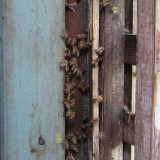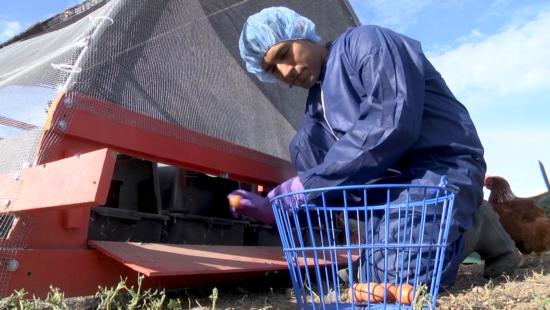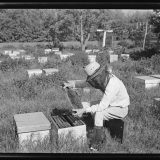
If you haven’t heard, Friends of the Earth is swarming (ahem) Home Depot and Lowes with cards around Valentines Day, asking these retailers to “show the bees some love” and stop selling bee-killing pesticides (neonicotinoids) and garden plants which have been pre-poisoned with such pesticides.
In our opinion, systemic pesticides, like Imidacloprid (which is a neonictinoid) should preferably not be used at all, and certainly should not be sold casually to uninformed consumers in big box stores. If you want to read more about the relationship between these poisons and bees, check out this Wikipedia article: Imidacloprid Effects on Bees
The Valentine’s Day stunt is just that, a stunt, but a cute one, and a worthwhile one, too. We’re going to send our Valentines off this year, and we hope you’ll join us.
If you give Friends of the Earth your email address, they’ll send you a reminder, a printable valentine, and further instructions about where to mail your cards. Go here for that.
Oh, and here’s a petition on the subject to the two stores’ CEO’s as well.




went out this morning to check the feeder and my bees are GONE! We’ve been getting nice mild days, but freezing nights for almost 2 months now, so presume they are DEAD.
bummer
I am so very sorry about your bees! What strange timing with our post, too. I’ll send an extra Valentine in your bees’ name.
Maybe a plant virus, not systemic neonic insecticides, are what’s killing bees?
http://acsh.org/2014/01/latest-buzz-bee-colony-collapse-disorder-virus-pesticide-problem/
I don’t want to say I don’t trust the ACSH, but its views are suspiciously similar to those of the pesticide manufacturers that help fund it.
There’s a funny but relevant Daily Show clip from a few years back that ‘features’ the ACSH.
http://www.thedailyshow.com/watch/thu-may-14-2009/little-crop-of-horrors
I’m not saying viruses don’t play a part in CCD–my understanding is that the current research suggests a number of factors are combining to fuel a sort of perfect storm for honeybees; viruses and pesticides are just two of many contributing factors. The USDA ARS site has more info:
http://www.ars.usda.gov/news/docs.htm?docid=15572#research
I also suspect that whatever is ailing the honeybees is likely a constellation of stressors. And once an organism is stressed, it becomes more vulnerable to lesser threats, ones which might not slow down a healthier organism, so a snowball effect occurs. That said, it can’t hurt to take these pesticides off the big box shelves, so at least backyard bees won’t have to deal with them.
Ad thanks for the links, Jake!
Consider where this latest report came from, Max–a gov’t agency. I don’t trust their impartiality. No doubt a “plant virus” of some sort (results of GMO, maybe?) could affect bees, but it’s much more likely pesticides are the culprit. We need to get back to nature–back to home remedies for removing pests. We’re creating an imbalance of nature, and there are consequences.
Synchronicity: this morning the Mercola post is also on bees and includes a viewing of Queen of the Sun: What are the Bees Telling Us. The link is very long; if of interest, just google “Mercola” and “Queen of the Sun.”
“The keeping of bees is like the direction of sunbeams.”
– Henry David Thoreau
Last year I bought a few plants from Lowes, not knowing about all this! (3 coneflower plants, rhododendron shrub, weiglia) I’m just learning about this insecticide and don’t know much about it but that it kills all insects. How long does it take for the toxin to get off the plant, can you keep spraying the plant or wash it off? Or are these plants just doomed to always be killing insects? I’m planning to make my yard a monarch waystation (I’ve started an Indiegogo project, all linked to on my blog http://www.ex-scapes.com)!
Well, there’s a lot here. First, are you sure your plants were treated? I don’t know that they treat all of their plants. You could call and ask. In terms of time, all we know is that when citrus plants out here are sprayed with similar insecticides, it takes 6 months for the chemicals to wear off. So six months might be a good round number. We’re guessing here–this stuff is complex, so best avoided entirely, IMHO.
We avoid big box plants as a rule, since besides this problem, they are often in poor health, not suitable for the local climate, and sometimes carry diseases. A couple years ago contaminated tomato seedlings being sold in big box stores caused East coast gardeners no end of grief by infecting their gardens with Early Blight.
If you have any native plant nurseries/botanical gardens in your area you may want to visit them–they will have all sorts of ideas for monarch friendly plants, and likely very nice, insecticide-free stock.